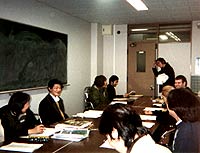 Comparative Literature is a discipline focusing primarily on how modern Western and Japanese literature have influenced each other. However, the discipline goes further than merely cataloging the influence of specific works in the sense of a “balance sheet” or ingredients label. In the study of comparative literature, one is required to critique the major premise of globalization in literature, which was born out of the need to accept the modern literature of “the West” as well as resistance to globalization and the distinctive changes that have emerged as a result. For example, a key tenet of comparative literature concerns exploring how Western interest in the East (exhibited in the forms of Orientalism and Japonisme) was received in Japan and how, as a result, the frameworks of “Japan” and “the West” were constructed and transformed.
Comparative Literature is a discipline focusing primarily on how modern Western and Japanese literature have influenced each other. However, the discipline goes further than merely cataloging the influence of specific works in the sense of a “balance sheet” or ingredients label. In the study of comparative literature, one is required to critique the major premise of globalization in literature, which was born out of the need to accept the modern literature of “the West” as well as resistance to globalization and the distinctive changes that have emerged as a result. For example, a key tenet of comparative literature concerns exploring how Western interest in the East (exhibited in the forms of Orientalism and Japonisme) was received in Japan and how, as a result, the frameworks of “Japan” and “the West” were constructed and transformed.
The discipline also encompasses cross-cultural research of literature from around the world within the confines of a specific theme, the mutual influences between art and literature, as well as empire and postcolonialism.
In all cases, analytical literary comparisons require historical investigation and close reading of both texts being compared. To acquire the basic capacity for literary comparison, students need to possess sufficient command of language and rigorous methodology.
Professor
- HASHIMOTO, Yorimitsu (Ph.D.)
- Comparative Literature and Culture; British Studies
Associate Professor
- SUZUKI, Akiyo (Ph.D.)
- Modern Japanese Literature,Comparative Literature
